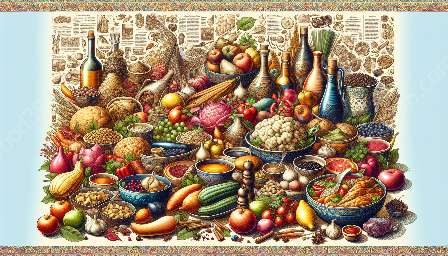Food holds a central place in ancient civilizations, serving as a form of cultural expression that reflects traditions, rituals, and the evolution of food culture. Ancient food traditions and rituals have deep-seated roots, contributing to diverse culinary practices and customs. This article delves into the ways in which ancient civilizations used food as a means of cultural expression, exploring the origin and evolution of food culture.
Ancient Food Traditions and Rituals
Ancient food traditions and rituals were integral to the fabric of society, often intertwined with religious, social, and communal significance. From the elaborate feasts of the Egyptians to the sacred offerings of the Mayans, food played a pivotal role in ceremonies and festivities, symbolizing abundance, fertility, and spiritual connections.
For instance, in ancient Egypt, food offerings were presented to honor the gods and sustain the deceased in the afterlife. The elaborate burial practices, including the provision of food and drink, highlight the deep-rooted belief in the continuity of life beyond death and the importance of sustenance in the afterworld.
Similarly, the Mayans engaged in elaborate rituals and ceremonies featuring cacao, a revered and precious commodity. Cacao was not only consumed as a beverage but also used in various religious and social ceremonies, symbolizing wealth, vitality, and divine connections.
Moreover, food played a crucial role in communal gatherings and feasts, fostering social cohesion and solidarity. The sharing of meals and the preparation of traditional dishes were central to fostering a sense of belonging and identity within ancient civilizations.
Origin and Evolution of Food Culture
The origin of food culture can be traced back to the early agricultural practices and the domestication of plants and animals by ancient civilizations. The cultivation of crops and the development of cooking techniques gave rise to distinct culinary traditions and dietary habits, shaping the evolution of food culture.
Ancient civilizations not only adapted to their natural surroundings but also transformed the landscape through agriculture, influencing the availability of food and the development of regional cuisines. The diverse climates and geography of ancient societies contributed to a rich tapestry of culinary diversity, with each region boasting unique ingredients, flavors, and cooking methods.
Furthermore, trade and exchange of foodstuffs among ancient civilizations led to the diffusion of culinary practices, introducing new ingredients and flavor profiles that enriched the food culture of different societies. The intermingling of food traditions through trade routes and cultural exchange further contributed to the evolution of culinary customs and gastronomic heritage.
As ancient civilizations flourished and expanded, food became a marker of identity and social stratification, distinguishing the elite from the common populace. Elaborate banquets and lavish feasts served as displays of wealth and power, showcasing the culinary prowess of rulers and nobility, while also reinforcing social hierarchies.
Moreover, the codification of culinary practices and dietary laws, as seen in ancient religious texts and societal norms, played a pivotal role in shaping food culture. Dietary restrictions, food taboos, and feasting protocols were entrenched in the social fabric, governing the consumption and preparation of food in accordance with religious, cultural, and ethical precepts.
Conclusion
From the sacred rituals of offering to the development of distinctive culinary practices, ancient civilizations used food as a powerful means of cultural expression, reflecting their beliefs, values, and societal structures. The intricate web of ancient food traditions and rituals, coupled with the evolution of food culture, highlights the enduring impact of food as a cultural artifact. Through the lens of food, we gain insight into the rich tapestry of ancient civilizations and their profound connection to the culinary heritage that continues to resonate in modern times.


